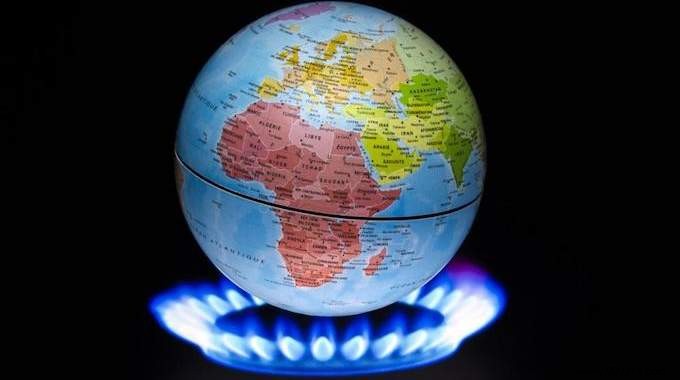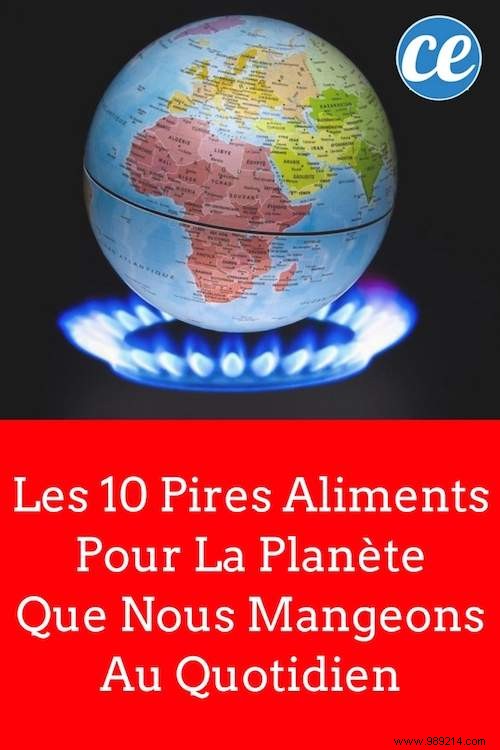
A good burger is really so good!
But when you bite into it, do you think about the impact it has on the environment?
Well, maybe you should... For my part, I really try to put in the effort.
Why ? Because climate change is more than ever a reality .
And unfortunately, agriculture is one of the largest sources of greenhouse gases.
This is particularly the case for gases such as methane and carbon dioxide (CO2).

The American NGO specializing in environmental protection, "The Environmental Working Group", has released a very interesting report on the subject.
It's called "Climate Change and Health:The Eater's Guide".
This guide reveals the most "expensive" foods in terms of C02... and therefore the most harmful to our planet.
Eating it too frequently is therefore not recommended...
For my part, it really encouraged me to change the content of my plate.
Find out which are the 10 foods that produce the most CO2 per kg of food:
Aaah... the Sunday lamb! Who doesn't love this?!
Sorry for the amateurs, eating 1 kg of lamb is equivalent to driving a car for 150 km.
Its carbon footprint is really significant:39.3 kg of CO2 per kg of meat tasted.
How to explain it? On the one hand, it is the CO2 produced by the farming activity itself.
But most of it comes from what farms and slaughterhouses reject for their overall operation as well as... animal farts.
Eh yes ! The digestion of sheep is known to cause a lot of flatulence which also harms the ozone layer.
Even if it is not as serious as for lamb, beef remains a meat with a very high climate cost.
Cows produce a lot of methane, a powerful greenhouse gas.
In addition, their breeding requires a lot of water and land.
For 1 kg of beef consumed, it is thus more than 27 kg of CO2 that are produced.
So, finished, the steak or the burger? For the good of the environment and our health, it is a question of at least reducing the frequency of our consumption...
Our national treasure is not spared by this report, especially cow's milk cheeses.
With 13.5 kg of CO2 per kg of cheese eaten, it is a food that weighs on the "carbon balance".
Why ? For the same reasons stated for beef above:the maintenance of a farm produces a lot of greenhouse gases.
Knowing that it takes several liters of milk to produce one kg of cheese, the bill goes up quickly!
So, when it comes to cheese imported by plane, boat or truck, it's even worse...
Ham, sausage, roast, sausage... If this meat is rather widespread in our gastronomy, it might be time to review our habits a little.
Because, for 1 kg of pork, it is 12.1 kg of CO2 released into the atmosphere!
Of course, half is due to animal husbandry.
But a good part also comes from slaughter, transport and... the CO2 produced by cooking the meat at home.
It's true, salmon is so good! With the holidays, we like to enjoy them.
The problem is that livestock farms produce more than 11.9 kg of CO2 to market 1 kg of salmon.
And yes, it's essential to feed them, but also because of their high electricity and fuel needs.
And it's also true for organic salmon!
The report does not discuss carbon emissions caused by so-called "wild" fishing.
But we also know its limits, especially for our health...
As with other meats, the pollution caused by farming, processing the meat, transporting it and... cooking it once in our kitchen is the cause!
With 10.9 kg of CO2 for 1 kg of meat, turkey is obviously not the most polluting meat in this classification.
That said, it is worth remembering how heavy the production of their food (mostly corn) is for our environment...
Especially in used water and cultivated land.
If, like me, you want to reduce the carbon footprint of your plate while remaining carnivorous, chicken is still the best solution .
It is the meat that produces the least CO2:"only" 6.9 kg for 1 kg .
Certainly the sources of pollution are identical to those of the turkey.
But the quantities of CO2 released for chicken are lower in each phase of its production.
To discover: Adopting a Hen is Doubly Economical!
It's true, tuna is good... and it's still very practical when you have nothing left in the fridge!
But, it is still 6.1 kg of CO2 that is produced for 1 kg of canned tuna.
The diesel consumed by boats fishing is indeed very polluting.
In addition, all the stages of processing, canning and then transporting this popular fish have a significant carbon cost...
With 4.8 kg of CO2 for 1 kg of eggs consumed, it is still the best source of animal protein and the least polluting!
Most of it comes from the feed given to the hens, the conditioning of the eggs and the energy needs of the farm itself.
In any case, it is better to choose them organic in order to limit the "carbon footprint" and preserve our health :-)
To discover: 7 Reasons Why You Should Have Eggs for Breakfast.
It is everywhere in our food! Hard to live without...
But did you know that the potato is the most polluting vegetable in terms of CO2? This represents 2.9 kg for 1 kg product.
Most of the carbon dioxide comes from the energy spent on electrical appliances.
This is what makes it possible to cook potatoes at home.
But, be aware that this varies according to the cooking method!
For example, baked potatoes will produce much more CO2 emissions than fries, because it takes less time.
Of course, it's not just the "carbon footprint" of a food that must be taken into account when you eat.
We also have to think about the nutritional balance, the production conditions (ethical or not) and, of course, our taste preferences :-)
Are you planning to cut down on your meat consumption? Know that you can compensate by eating foods rich in vegetable proteins like these.